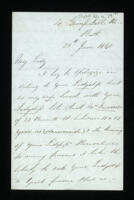Women’s Cosmopolitan Club, 133 East 40th Street (New York).—Sends news of her activities in the United States.
—————
Transcript
Circular letter.
Women’s Cosmopolitan Club, 133 East 40th Street
Nov. 2.
Well! Since I landed at New York on Monday a week ago, I have not had a dull minute. I’ve really been thrilled all the time. So far, I have not begun to sort up my impressions at all—I am much too taken up with receiving them.
This morning I was invited to attend the Children’s Court. {1} Judge Hoyt is the permanent Acting Judge in this Court. He is the grandson of Chase, {2} who was a Member of Lincoln’s Cabinet, a man, thirty-five years of age—Conservative in politics but in this matter of reform an enthusiast. He has been educated to his present position by Miss Doty a solicitor & barrister who at present holds an official position as one of the Prison Commissioners. Arriving at the Court, seats were placed for us beside Judge Hoyt who explained the cases to us & handed us the wonderful dossiers supplied with each little offender—giving all details as to parents, character of home, school-record—health record—standard of living & every conceivable fact to be ascertained with regard to the child, his conditions & surroundings.
The Judge has a personal talk to each child brought before him & encourages the child to talk to him & to confess his fault. {1} If confessed, he can deal with the matter without any formality. If the offence is denied, the procedure of a trial with witnesses has to be gone through—but it is very informal—the group stands right in front of the Judge—face to face—& there are no police to be seen, unless it is the officer who has arrested the culprit, then he comes up to give his evidence like anybody else & goes away again as soon as his witness is ended. The Parents of the child stand just within call—and the Probation Officers who have first won the confidence of the children, stand beside them to encourage them or to confer with the Judge.
There are 26 Probation Officers attached to the Court, besides missionaries of very denomination—there is also a Guild of “Big Brothers” which the Judge himself has founded—each Big Brother taking voluntary friendly charge of some wayward little brother & trying to pull him through the critical period of his life.
Every child is put under probation for a certain number of months, only in very hopeless cases is he (or she) sent to a Reformatory—as the Judge holds that almost any sort of a home is better for a child than a semi penal institution. The parents are visited & helped by sympathy & advice. About 10,000 children pass through this Court per annum & the greater percentage of these turn out well under the system. A new Children’s Court is now being built—here the Judge’s bench is begin done away with entirely, & he will see every case alone—in conference with probation officers, parents etc. Waiting rooms are large airy & comfortable & a special waiting room is set aside for Mothers with babies. We saw 7 cases dealt with in an hour & a half. Most of these were remanded—or were being dealt with at a a second or third hearing after being thoroughly investigated in the meanwhile.
In one case a little boy was arrested by the police intolerantly & in an ill judged way. The small boy gave his version of the story to the Judge, obviously sincerely & truthfully, & his word was taken & the boy was discharged quite kindly & left the Court. Judge Hoyt is very proud of the record of the Court for the last four years. Speaking to Miss Doty he said. We have done this thing between us. “You educated me & I have educated the Court.” {1}
He would like to have Miss Doty as Assistant Judge to deal especially with the girls. But that would need a Bill being passed in the Legislature, as Women Judges are not yet admitted into the scheme in New York State. There is some hope of such a Bill being passed before very long.
We returned to lunch with Miss Doty & had a most thrilling talk. Before taking up the duties of Prison Commissioner—Miss Doty went to prison for a week as an ordinary criminal. No one knew of her identity except the Head Commissioner who sent her to Sing Sing Prison under the escort of two police officers. Some of her stories of prisoners were simply wonderful. One about a man who was executed for a murder, (in her opinion the man was innocent of the charge) was the most touching I ever heard. They made a compact together to use his story to help save “the kids” & he was writing this story for her up to the very moment that he was taken from his cell for execution. Many other stories she told us till we had to tear ourselves away to keep the next appointment. Tomorrow is the anniversary of her voluntary imprisonment & she is dining with us & we are going together afterwards to the Night Courts, to see how New York attempts to deal with its women prostitutes.
Subsequently today I had an interview with Miss Mullholland who is trying to get a Bill introduced in the Legislature to alter the law that deprives American women of citizenship upon their marriage with aliens. This she thinks will be taken up & passed owing to the women’s votes in the Western States.
Tomorrow the Elections will take place & we shall know how many more Suffrage States are to be added to the record.
This letter only deals with a few hours out of one day. And every day is full.
My own work is going on all the time too. And when I am not listening & learning—I am talking & laying down the law!
I am going to Boston, Washington & Chicago shortly. At the latter place we are invited to stay with Miss Jane Addams at Hull House.
Now I must go. Love & greeting to the circle of dear friends at home.
Emmeline Pethick Lawrence
Yesterday was a typical day. Here is my Diary—
10. a.m. Interview—Mrs Chapman Catt
1.30 Luncheon[.] Miss Lewisohn & friends.
4.0 Tea. Miss Doty & a large circle.
6.30 Dinner. Miss Stanton Blatch.
—————
{1} Full stop supplied.
{2} Salmon Portland Chase (1808-1873). Judge Hoyt was the son of Chase’s youngest daughter, Janet, known as ‘Nettie’.



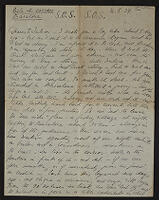

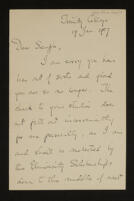
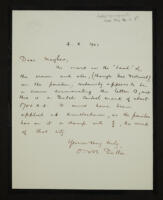
![Letters from Robert Leslie Ellis to [William] Walton](/uploads/r/trinity-college-library/8/f/3/8f30ec493294eb4cc692d2891708084e56bc00f545bfddcd5a1db6ebf9c42b06/Add.ms.c.67.10-88_thumb.jpg)

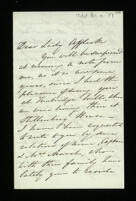










![Letters from Robert Leslie Ellis to [William Whewell]](/uploads/r/trinity-college-library/f/c/7/fc7598777cae689b4e92dce42769a8471f5b536862917b31965982971f6f7ebe/Add.ms.c.67.100-108_thumb.jpg)





